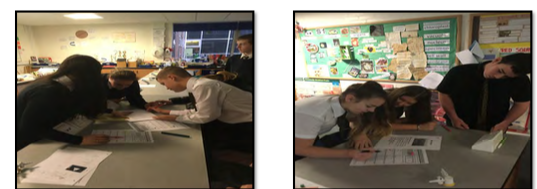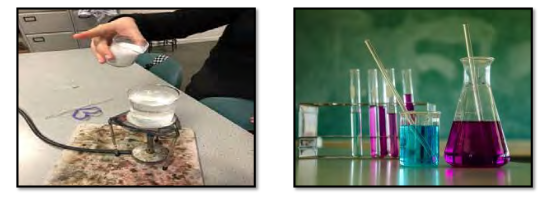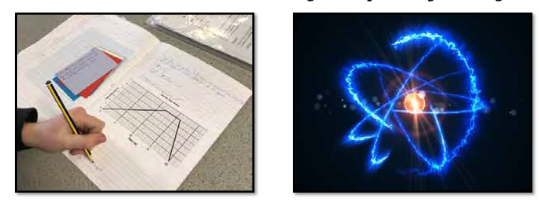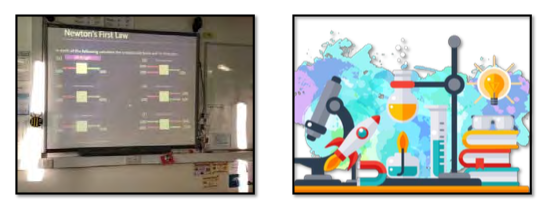Biology
What will I learn?
The purpose of this course is to allow young people to develop a secure understanding of important biological concepts and encourage them to have a lifelong interest in Biology and its applications. Learners will progress onto Level 4 Experiences and Outcomes and will study topics on interdependence of organisms and their environment, plant growth and reproduction, respiration, animal behaviour, cell growth and repair, genetics as well as having opportunities to debate moral and ethical issues associated with some controversial biological procedures such as stem cells and DNA profiling.
How will I learn?
Learners will work collaboratively to carry out experiments, research tasks and presentations. They will also have the opportunity to discuss and debate the moral and ethical implications of current scientific issues.
Learners will continue to take part in scientific investigations to further develop the skills of predicting, planning, observing, measuring, recording, presenting information, analysing, concluding and evaluating.
There will also be opportunities for the development of literacy and numeracy skills and where appropriate, aspects of health and wellbeing and ICT will be included.
How will I be assessed?
Assessment will be ongoing throughout the course and will take a variety of forms. Formal end-of-topic written assessments will allow learners to demonstrate their understanding of biological concepts and their ability to apply their knowledge in problem solving questions. Learners will also demonstrate their progress through scientific investigations and research/presentation tasks. Regular homework will be issued to allow pupils to consolidate their learning and allow them to receive valuable feedback on their progress.
Career Opportunities
There are many and varied career opportunities for students of Biology including research, teaching, health care professionals (Medicine, Nursing, Physiotherapy, Occupational Health, etc.), sport sciences, food industries, zoology/animal care, forensics, etc.

Chemistry
What will I learn?
The purpose of this course is to allow young people to develop a secure understanding of important chemical concepts and encourage them to have a lifelong interest in Chemistry and its applications. Learners will progress onto Level 4 Experiences and Outcomes and will study topics on atomic structure and chemical bonding, metals and their reactivity, cells and batteries, fuels and carbon chemistry, plastics and novel materials and energy changes in chemical reactions.
How will I learn?
Learners will work collaboratively to carry out experiments, research tasks and presentations. They will also have the opportunity to discuss and debate the moral and ethical implications of current scientific issues.
Learners will continue to take part in scientific investigations to further develop the skills of predicting, planning, observing, measuring, recording, presenting information, analysing, concluding and evaluating.
There will also be opportunities for the development of literacy and numeracy skills and where appropriate, aspects of health and wellbeing and ICT will be included.
How will I be assessed?
Assessment will be ongoing throughout the course and will take a variety of forms. Formal end-of-topic written assessments will allow learners to demonstrate their understanding of chemical concepts and their ability to apply their knowledge in problem solving questions. Learners will also demonstrate their progress through scientific investigations and research/presentation tasks. Regular homework will be issued to allow pupils to consolidate their learning and allow them to receive valuable feedback on their progress.
Career Opportunities
There are many career paths open to those who study Chemistry. A career in Medicine, Dentistry, Engineering, Veterinary Medicine, Pharmacy, Forensics and Teaching are only a few of the opportunities available to students who wish to progress their study of this subject. With roles in the pharmaceutical, nuclear, oil/gas, alternative energy and food industries and in the health sector being common.

Physics
What will I learn?
The purpose of this course is to allow young people to develop a secure understanding of important physical concepts and encourage them to have a lifelong interest in Physics and its applications. Learners will progress onto Level 4 Experiences and Outcomes and will study topics on waves, sound and optics, movement and forces, energy and magnetism, space, and electricity and practical circuits.
How will I learn?
Learners will work collaboratively to carry out experiments, research tasks and presentations. They will also have the opportunity to discuss and debate the moral and ethical implications of current scientific issues.
Learners will continue to take part in scientific investigations to further develop the skills of predicting, planning, observing, measuring, recording, presenting information, analysing, concluding and evaluating.
There will also be opportunities for the development of literacy and numeracy skills and where appropriate, aspects of health and wellbeing and ICT will be included.
How will I be assessed?
Assessment will be ongoing throughout the course and will take a variety of forms. Formal end-of-topic written assessments will allow learners to demonstrate their understanding of physical concepts and their ability to apply their knowledge in problem solving questions. Learners will also demonstrate their progress through scientific investigations and research/presentation tasks. Regular homework will be issued to allow pupils to consolidate their learning and allow them to receive valuable feedback on their progress.
Career Opportunities
There are many career paths open to those who study Physics. It is at the forefront for academic research into Cosmology and Nanotechnology. There are also many routes into mechanical, electrical and civil engineering from apprentice through HNC/HND and Graduate level. Physics also plays a major role in diagnosis and treatment in Medicine.

Combined Sciences
What will I learn?
In this course learners will consolidate their understanding of the Science level 3 Experiences and Outcomes. They will continue to study biology, chemistry and physics. The units studied will be: Fragile Earth – investigate earth’s resources through activities related to their source, origin, production, extraction, uses and benefits.
Human Health – develop an understanding of factors which contribute to a healthy lifestyle, cover procedures to measure physical fitness, investigate mental/social health issues and research media reports of national/international health areas. Applications of Science – explore science’s contribution to communication technologies and the impact that these have had on society/environment. They will also research the production and use of new materials and how science helps the understanding of risk and how it can be reduced in modern life.
How will I learn?
Learners will work collaboratively to carry out experiments, research tasks and presentations. They will also have the opportunity to discuss and debate the moral and ethical implications of current scientific issues.
Learners will continue to take part in scientific investigations to further develop the skills of predicting, planning, observing, measuring, recording, presenting information, analysing, concluding and evaluating.
There will also be opportunities for the development of literacy and numeracy skills and where appropriate, aspects of health and wellbeing and ICT will be included.
How will I be assessed?
Assessment will be ongoing throughout the course and a variety of methods will be used. Learners will be expected to be able to apply their skills of scientific inquiry to carry out an experiment / practical investigation. They will also need to show their knowledge and understanding of the key areas of each unit and apply their scientific skills in unfamiliar contexts.
Career Opportunities
There are many career paths open to those who study Science. Careers in the oil/gas, nuclear and chemical industries are common as well as opportunities in the health sector or in sports science. Science subjects are also very valuable for several trades e.g. electrician.


